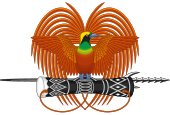
The politics of Papua New Guinea takes place in a framework of a parliamentary representative democratic multi-party system, whereby the prime minister is the head of government. Papua New Guinea is an independent Commonwealth realm, with the monarch serving as head of state and a governor-general, nominated by the National Parliament, serving as their representative. Executive power is exercised by the government. Legislative power is vested in both the government and parliament.
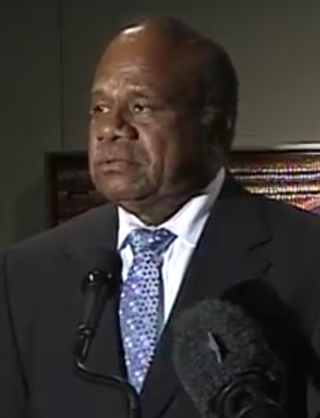
Sir Rabbie Langanai Namaliu was a Papua New Guinean politician. He served as the fourth prime minister of Papua New Guinea from 4 July 1988 to 17 July 1992 as leader of the Pangu Party.
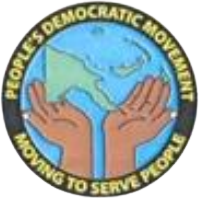
The People's Democratic Movement is a political party in Papua New Guinea.
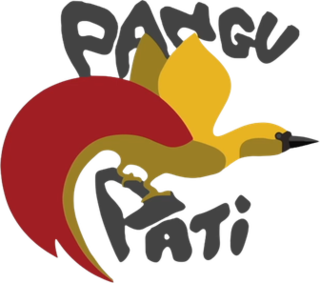
The Pangu Pati, officially Papua na Niugini Yunion Pati, is a nationalist and developmentalist political party on the centre-left in Papua New Guinea.The party is the oldest political party in Papua New Guinea and has held all levels of government throughout its history. As of 2023, it is the largest party in the National Parliament.
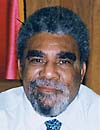
Sir Mekere Morauta was a Papua New Guinean politician and economist who served as the 7th Prime Minister of Papua New Guinea from 1999 to 2002. Inheriting a depressed economy and a fractious legislature, he embarked on fundamental reforms of the country's economy and political system.

Sir Michael Thomas Somare was a Papua New Guinean politician. Widely called the "father of the nation", he was the first Prime Minister after independence. At the time of his death, Somare was also the longest-serving prime minister, having been in office for 17 years over three separate terms: from 1975 to 1980; from 1982 to 1985; and from 2002 to 2011. His political career spanned from 1968 until his retirement in 2017. Besides serving as PM, he was minister of foreign affairs, leader of the opposition and governor of East Sepik Province.

The National Alliance Party has operated as a political party in Papua New Guinea since 1995. As of May 2019, the party had 11 members in the 111-seat National Parliament of Papua New Guinea, and was part of the Alliance Accord for Change, opposition to the O'Neill led government for Papua New Guinea's 10th Parliament.
Francis Marus is a Papua New Guinean politician. He has been a member of the National Parliament of Papua New Guinea since July 2007, representing the electorate of Talasea Open. He was Minister for Higher Education, Research, Science and Technology in the government of Peter O'Neill from July 2016. He was previously the Deputy Speaker of the National Parliament from 2007 to 2012. He has variously represented the Pangu Party (2007–2012), the Papua New Guinea Party (2012–2013), the United Resources Party (2013–2014) and the People's National Congress (2014–present).

James Marape is a Papua New Guinean politician who has served as the prime minister of Papua New Guinea since May 2019. He has been a member of the National Parliament of Papua New Guinea since July 2007, representing the electorate of Tari-Pori Open in Hela Province in the highlands. He has held Cabinet Posts as Minister of Education (2008–2011), Minister of Finance (2012–2019), and Minister of Foreign Affairs (2023–present). Marape entered the 2022 elections under the banner of Pangu Party and won more seats than any other party. He was therefore entitled to form the government. His new government was elected unopposed by the new parliament.

General elections were held in Papua New Guinea between 5 and 26 June 1982. The result was a victory for the Pangu Party, which won 51 of the 109 seats. Voter turnout was 52%.

General elections were held in Papua New Guinea between 13 June and 4 July 1987. The Pangu Party emerged as the largest party, winning 26 of the 109 seats. Voter turnout was 73.5%.

Sir Puka Temu,, is a Papua New Guinean politician. He has been a member of the National Parliament of Papua New Guinea since 2002, representing the electorate of Abau Open. A former Deputy Prime Minister under Michael Somare, he is part of Prime Minister James Marape's government as a member of the Our Development Party.

Nahau Rooney, CSM was a Papua New Guinean politician. From 1977 to 1987 she was a member of the newly founded post-independence National Parliament of Papua New Guinea.

Samuel H. Basil was a Papua New Guinean politician. He was a member of the National Parliament of Papua New Guinea from 2007, representing the electorate of Bulolo Open, until his death in 2022. From 8 June 2019, to August 2019 Basil served as the Treasurer of Papua New Guinea.

General elections were held in the Territory of Papua and New Guinea between 19 February and 11 March 1972. They saw the election of the country's first female MP, Josephine Abaijah.
Posu Ank was a Papua New Guinean politician. He served as a member of the National Parliament between 1977 and 1982.
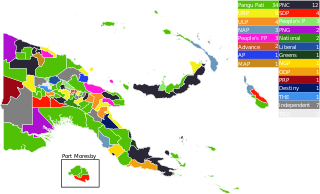
General elections were held in Papua New Guinea from 4 to 22 July 2022 to elect the members of the National Parliament for a new five-year term.

Sir Joseph Nombri was a politician, administrator and diplomat in Papua New Guinea (PNG). He played an important role in events leading up to PNG's independence in 1975 and later became the country's ambassador in Tokyo.
Vin ToBaining was one of the first six elected indigenous members of the colonial-era Legislative Council of Papua and New Guinea, between 1961 and 1963. Subsequently, he was involved in the formation of the Pangu Party in 1967, which went on to form the government of Papua New Guinea (PNG) when the country became independent in 1975.
Job Pomat CMG is a Papua New Guinean politician. He has represented the electorate of Manus Open in the National Parliament of Papua New Guinea on two separate occasions since 2007 and has been Speaker of the National Parliament since 2017.
